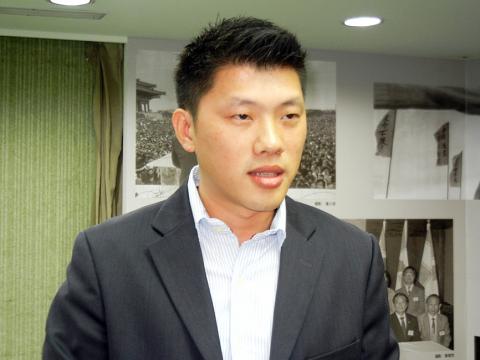Democratic Progressive Party (DPP) Chairman Su Tseng-chang (蘇貞昌) yesterday appointed his long-time aide Lin Hsi-yao (林錫耀) as the party’s secretary-general while also making former representative to the US Joseph Wu (吳釗燮) the head of the DPP’s policy-making body.
The appointments — Su’s first since the former premier took over the party helm on May 27 — also included three deputy secretary-generals: former Pingtung County legislator Lin Yu-shen (林育生), who is close to Su; former Tainan County lawmaker Lee Chun-yi (李俊毅) and former DPP spokesperson Lin Yu-chang (林右昌), DPP spokesperson Wang Min-sheng (王閔生) told a press conference.
A long-time colleague of Su’s, Lin Hsi-yao served for five years as deputy commissioner in Taipei County — now known as New Taipei City (新北市) — when Su was the county commissioner between 1997 and 2004. Lin served as the county’s acting commissioner between 2004 and 2005.

Photo: Lee Hsin-fang, Taipei Times
The decision to appoint Wu as director of the DPP’s Policy Research Committee has raised eyebrows and it appears to reflect Su’s intention to improve ties with Washington, Beijing and pro-independence forces within the DPP.
Wu — now a researcher at National Cheng Chi University’s Institute of International Relations — has wide experience handling cross-strait and Taiwan-US relations during DPP administrations and served as chairman of the Mainland Affairs Council between 2004 and 2007. He was Taiwan’s representative to the US between 2007 and 2008.
Su has also made efforts to divide power among major party factions with the appointments of deputy secretary-generals Lee, who is close to former premier Frank Hsieh (謝長廷) and Yu-chang Lin.
Su has sought to nominate the best possible candidates for the positions, Wang said.
More appointments are expected to be unveiled at the Central Standing Committee meeting tomorrow, Wang said.

A preclearance service to facilitate entry for people traveling to select airports in Japan would be available from Thursday next week to Feb. 25 at Taiwan Taoyuan International Airport, Taoyuan International Airport Corp (TIAC) said on Tuesday. The service was first made available to Taiwanese travelers throughout the winter vacation of 2024 and during the Lunar New Year holiday. In addition to flights to the Japanese cities of Hakodate, Asahikawa, Akita, Sendai, Niigata, Okayama, Takamatsu, Kumamoto and Kagoshima, the service would be available to travelers to Kobe and Oita. The service can be accessed by passengers of 15 flight routes operated by

GIVE AND TAKE: Blood demand continues to rise each year, while fewer young donors are available due to the nation’s falling birthrate, a doctor said Blood donors can redeem points earned from donations to obtain limited edition Formosan black bear travel mugs, the Kaohsiung Blood Center said yesterday, as it announced a goal of stocking 20,000 units of blood prior to the Lunar New Year. The last month of the lunar year is National Blood Donation Month, when local centers seek to stockpile blood for use during the Lunar New Year holiday. The blood demand in southern Taiwan — including Tainan and Kaohsiung, as well as Chiayi, Pingtung, Penghu and Taitung counties — is about 2,000 units per day, the center said. The donation campaign aims to boost

ENHANCING EFFICIENCY: The apron can accommodate 16 airplanes overnight at Taoyuan airport while work on the third runway continues, the transport minister said A new temporary overnight parking apron at Taiwan Taoyuan International Airport is to start operating on Friday next week to boost operational efficiency while the third runway is being constructed, the Ministry of Transportation and Communications said yesterday. The apron — one of the crucial projects in the construction of the third runway — can accommodate 16 aircraft overnight at the nation’s largest international airport, Minister of Transportation and Communications Chen Shih-kai (陳世凱) told reporters while inspecting the new facility yesterday morning. Aside from providing the airport operator with greater flexibility in aircraft parking during the third runway construction,

American climber Alex Honnold is to attempt a free climb of Taipei 101 today at 9am, with traffic closures around the skyscraper. To accommodate the climb attempt and filming, the Taipei Department of Transportation said traffic controls would be enforced around the Taipei 101 area. If weather conditions delay the climb, the restrictions would be pushed back to tomorrow. Traffic controls would be in place today from 7am to 11am around the Taipei 101 area, the department said. Songzhi Road would be fully closed in both directions between Songlian Road and Xinyi Road Sec 5, it said, adding that bidirectional traffic controls would